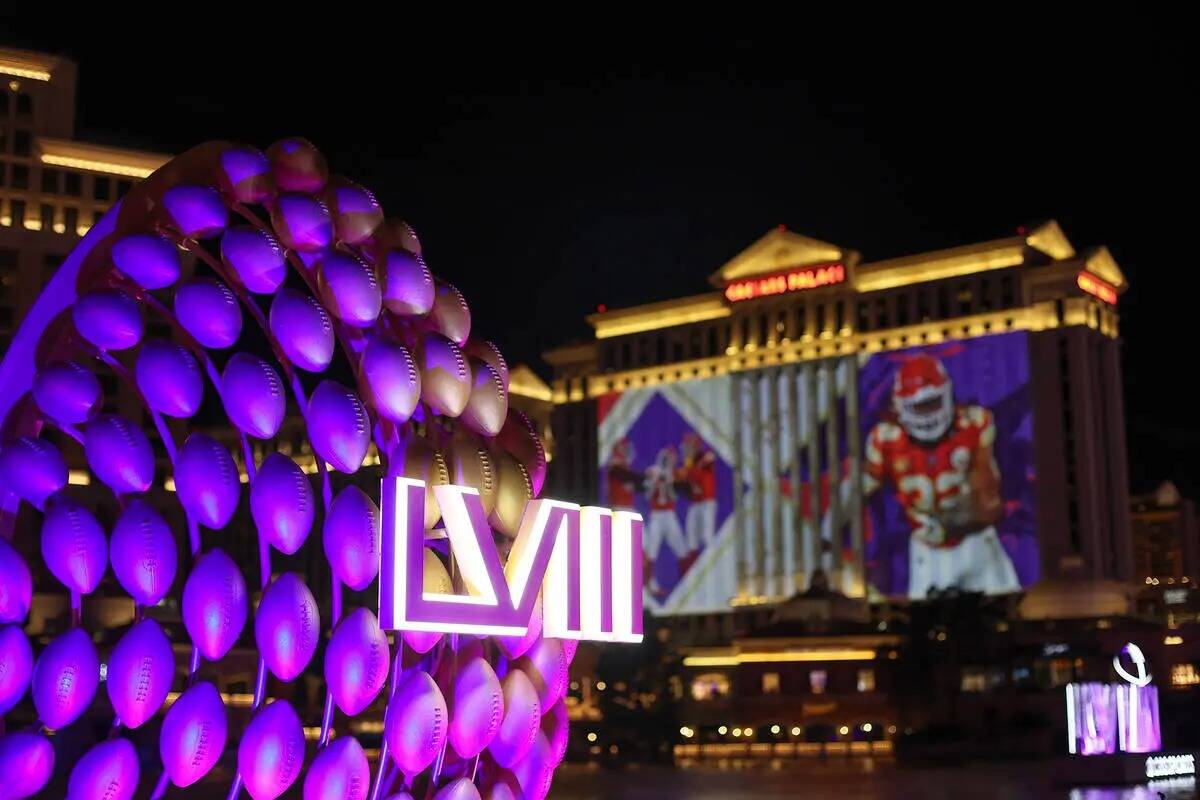‘This is what we’re created for’: Commissioners applaud Super Bowl success
Las Vegas’ Super Bowl success shouldn’t come as a surprise to anyone.
That’s according to Clark County commissioners, who pointed to the city’s history of hosting large-scale events and Allegiant Stadium’s proximity to the Las Vegas Strip’s abundance of hotel rooms and dining experiences.
“This is what we’ve been doing for years, so this is maybe the culmination,” Commissioner Tick Segerblom said. “That’s what we do — 150,000 rooms. We have restaurants. We have the best service people in the world. This is what we’re created for.”
Super Bowl 58, a nail-biting game that saw the Kansas City Chiefs narrowly defeat the San Francisco 49ers, was held at Allegiant Stadium earlier this month. The game was the most watched telecast in U.S. history, according to CBS Sports.
And that’s not all. The event is estimated to have brought more than $500 million in spending to the city — a number that is almost certainly on the low side, according to the Las Vegas Convention and Visitors Authority. That spending could reach more than $1 billion, analysts said.
The event “absolutely” solidified Las Vegas as the Entertainment Capital of the World, said Commissioner Marilyn Kirkpatrick.
It “gave us the opportunity to showcase what we could already do, but just in a higher scale,” Kirkpatrick said.
Part of the city’s success in hosting the Big Game is partly because of its layout, Commissioner Jim Gibson said.
“I think that we made it easier than it will be anywhere else to do a Super Bowl. And I think that the layout of this community is one of the most important aspects of that,” Gibson said.
‘Couldn’t ask for better exposure’
The event brought more than fans and revenue to the city. It brought international exposure to Las Vegas and all it has to offer, commissioners said.
“You couldn’t ask for better exposure for Las Vegas, which is what we want to do,” Segerblom said.
Commissioner William McCurdy II pointed to the marketing the city received, including through commercials featuring the Las Vegas skyline, its entertainment offerings and cuisine.
“I think it definitely put an exclamation mark on us being the sports and entertainment capital of the world,” McCurdy said. “Not only did we do it, we did it flawlessly.”
And getting to see the city be showcased in such a way is a point of pride for many in the community, said Commissioner Michael Naft.
“One thing that I’m really proud of is so many people who look at Las Vegas actually see it through a specific set of glasses, and I think we were really able to showcase the destination in the community in really special and unique ways,” Naft said. “Getting to see (Vegas) on the big screen is pretty uplifting.”
‘Hard to top’
Commissioners expect to receive an after-action review, but most said there wasn’t much that could have been improved on.
“I don’t think we missed many things when it comes to the Super Bowl,” Gibson said. “A lot of that is because this was the 58th Super Bowl. So they have a playbook that probably reflects a lot of mistakes that were corrected early on.”
When asked what he thought could have been done better, Naft said this event “will be hard to top.”
But Segerblom said business licensing staff were “really overworked” and said that there would be efforts to create a process so that those hoping to hold events wouldn’t have to go through multiple entities.
Super Bowl again?
Commissioners said there’s “absolutely” an appetite for the Super Bowl to be hosted in Las Vegas again.
“I think any major city that feels like they can host the Super Bowl tries to do it because of the economic impact,” said Commissioner Ross Miller. “We just happen to have the infrastructure in place already to be able to do it at a higher level than anywhere else in the world.”
Commissioners Kirkpatrick and Naft said part of that appetite stems from the National Football League’s community outreach efforts.
“I think that’s really what you have to do, is when you have these large events, the community has to have a stake in it, and they have to have ownership and I think that we had a very good partnership with the host committee and NFL,” Kirkpatrick said.
Naft said those efforts, including the NFL’s community engagement and prioritization of small businesses, is something other major events can learn from.
“I certainly think there’s a lesson to be taught for other major scale events who want to come or keep coming to Las Vegas about how to do things the right way,” Naft said.
‘Apples to oranges’
Despite its proximity and international prominence, commissioners agreed that the Super Bowl and Formula One were very different events.
Kirkpatrick said the comparison between Super Bowl and F1 was “apples to oranges.”
“Each event that we do is unique in Nevada,” Kirkpatrick said. “We treat it very unique, so there’s not a one size fits all.”
The events were different for lots of reasons, Gibson said. The impact on the Strip and surrounding traffic varied between the events, and the length of time to set up and tear down each event were also greatly different.
Gibson said F1 taught the county about how to better keep the public informed. But Naft said F1 had more lessons to learn from the Super Bowl than the other way around.
“They really are different events. However, just because the event is different, the scale and the scope and the logistics and demographics are different, doesn’t mean that some of the particulars about supporting local businesses need to be any different or that you shouldn’t support our nonprofit community,” Naft said.
Contact Taylor R. Avery at TAvery@reviewjournal.com. Follow @travery98 on X.

















